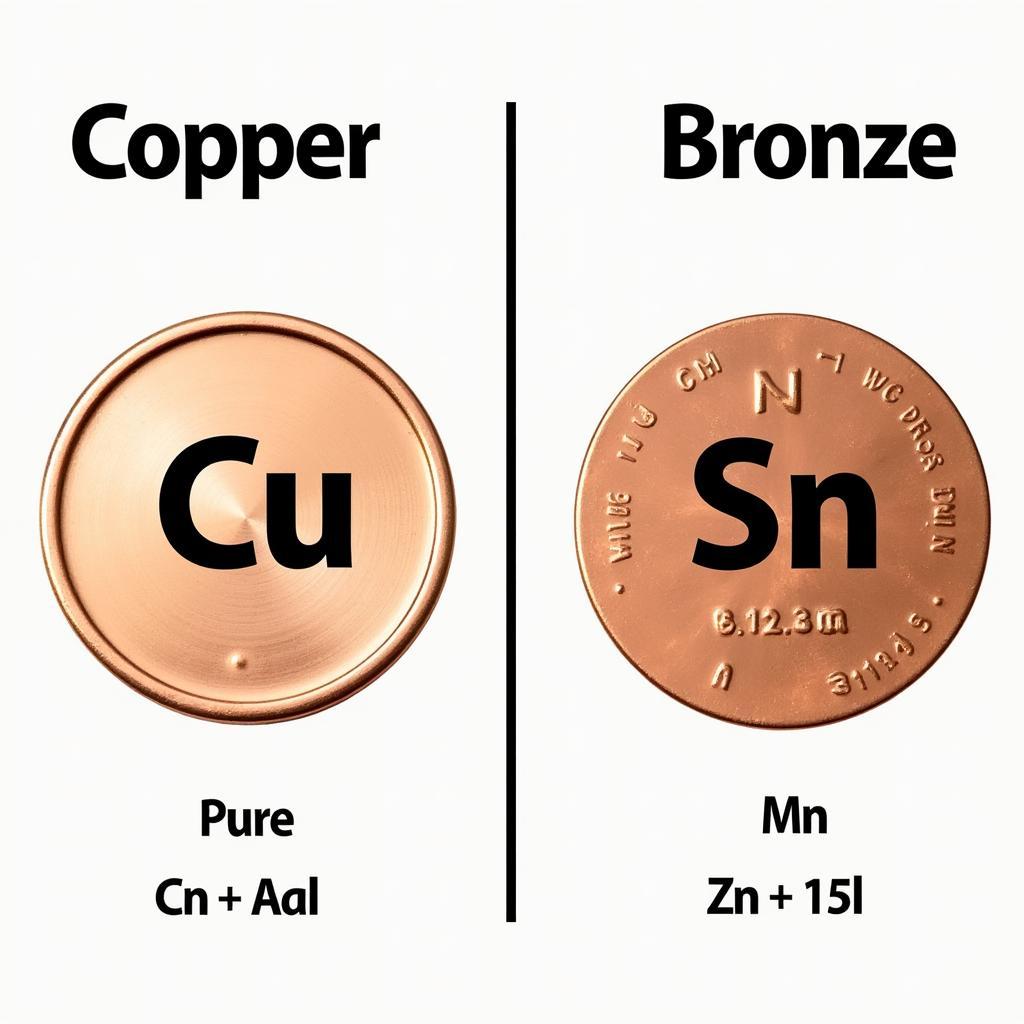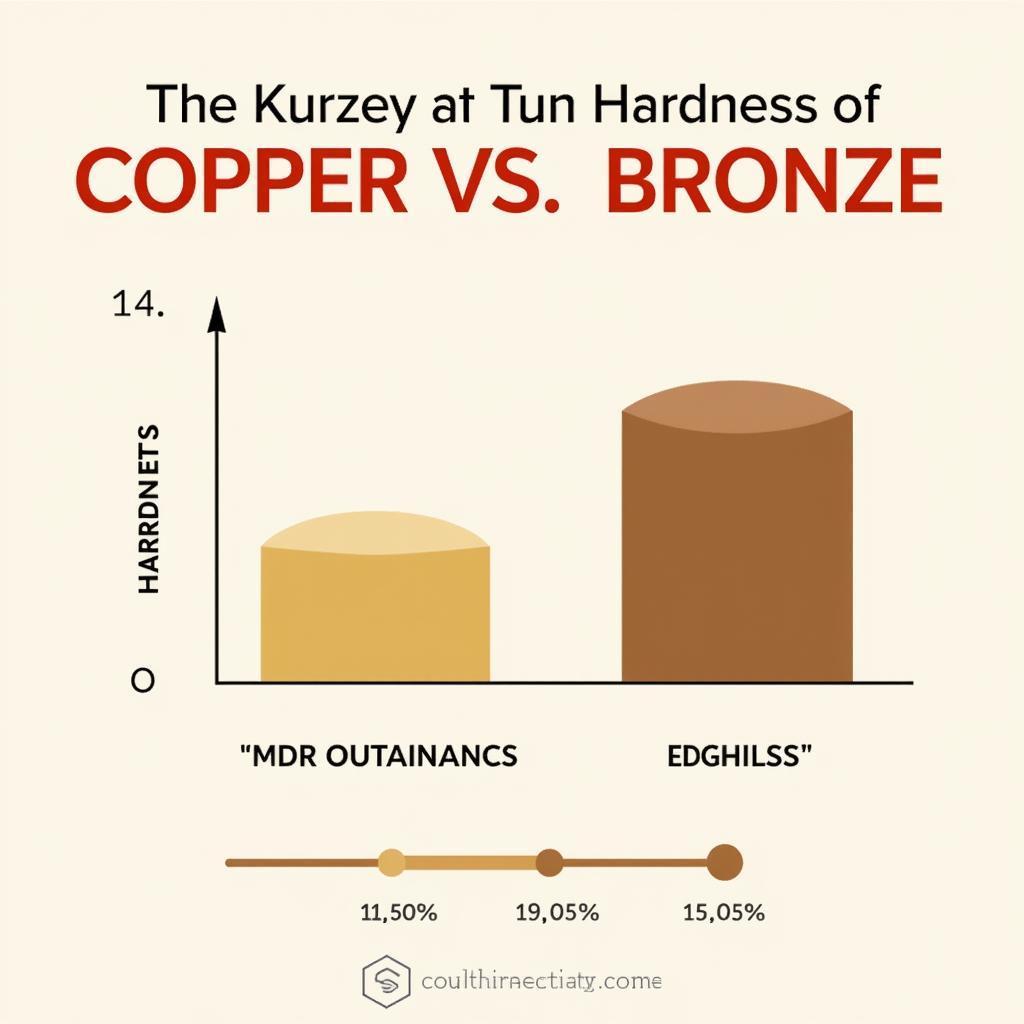Bronze and copper are two distinct metals with unique properties that influence their various applications. Understanding these differences is crucial for selecting the right material for a specific purpose. This article will delve into the core distinctions between bronze and copper, exploring their composition, properties, and uses.
Composition: The Core Difference Between Bronze and Copper
The primary difference between bronze and copper lies in their composition. Copper is a pure element, represented by the symbol Cu on the periodic table. Bronze, on the other hand, is an alloy primarily composed of copper, with tin as the main alloying element. Other elements, such as zinc, manganese, or aluminum, can also be added to create different types of bronze with varying properties.
Properties: Strength, Durability, and More
The addition of tin to copper significantly alters its properties, making bronze a stronger and more durable material. While copper is known for its excellent electrical and thermal conductivity, bronze offers superior hardness, resistance to corrosion, and lower melting point. These properties make bronze ideal for applications where strength and durability are paramount. Copper, with its malleability and ductility, remains a preferred choice for electrical wiring and plumbing.
 Comparison of Copper and Bronze Composition
Comparison of Copper and Bronze Composition
Applications: From Ancient Tools to Modern Technology
Both bronze and copper have played significant roles throughout history and continue to be essential materials in various industries. In ancient times, bronze was widely used for tools, weapons, and sculptures due to its strength and durability. Today, bronze is still found in marine hardware, musical instruments, and medals. Copper’s exceptional electrical conductivity makes it indispensable for electrical wiring, cables, and electronic components.
Bronze in Marine Environments
The corrosion resistance of bronze makes it particularly suitable for marine applications. Boat propellers, fittings, and other underwater components often utilize bronze to withstand the harsh saltwater environment.
Copper in Electrical Applications
Copper’s high electrical conductivity and ductility make it the ideal material for electrical wiring and cables. Its ability to efficiently conduct electricity minimizes energy loss and ensures reliable power transmission.
Why Choose Bronze over Copper?
If you require a material with enhanced strength, hardness, and corrosion resistance, bronze is the better choice. Its durability makes it suitable for demanding applications where copper might be prone to wear and tear.
Why Choose Copper over Bronze?
When superior electrical and thermal conductivity is paramount, copper is the preferred option. Its malleability also makes it easier to shape and form into various intricate designs.
What Makes Bronze Harder than Copper?
The addition of tin as an alloying element creates a solid solution that strengthens the copper matrix, resulting in a harder and more durable material.
 Hardness Comparison of Copper and Bronze
Hardness Comparison of Copper and Bronze
Conclusion: Bronze vs Copper – Choosing the Right Metal
The choice between bronze and copper depends entirely on the specific application and desired properties. While copper excels in electrical conductivity, bronze offers superior strength and corrosion resistance. Understanding these key differences between bronze and copper allows for informed decision-making when selecting the appropriate material for a given project.
FAQ
-
What is the main difference between bronze and copper? Bronze is an alloy primarily composed of copper and tin, while copper is a pure element.
-
Is bronze stronger than copper? Yes, bronze is generally stronger and more durable than copper.
-
What is bronze used for? Bronze is used in marine hardware, musical instruments, medals, and various industrial applications.
-
What is copper used for? Copper is primarily used in electrical wiring, plumbing, and electronic components.
-
Why is bronze resistant to corrosion? The addition of tin forms a protective layer on the surface of bronze, preventing corrosion.
-
Which metal is a better conductor of electricity? Copper is a significantly better conductor of electricity than bronze.
-
Which metal is more expensive? The price of both metals fluctuates, but generally, bronze can be more expensive than copper due to the addition of tin and other alloying elements.
Khi cần hỗ trợ hãy liên hệ Số Điện Thoại: 02838172459, Email: [email protected] Hoặc đến địa chỉ: 596 Đ. Hậu Giang, P.12, Quận 6, Hồ Chí Minh 70000, Việt Nam. Chúng tôi có đội ngũ chăm sóc khách hàng 24/7.